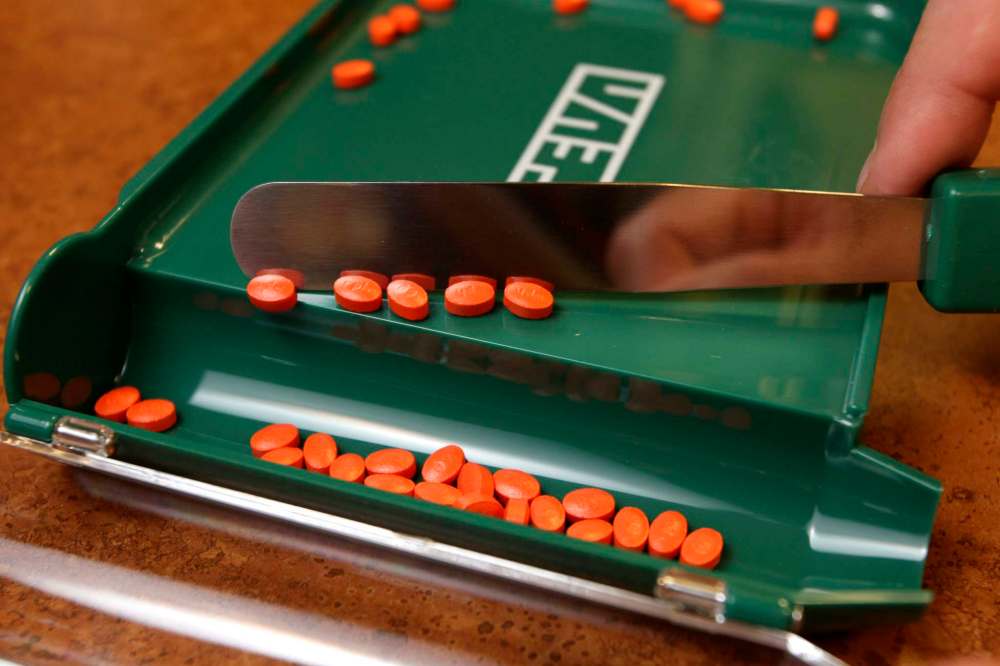Province capping pharmacy dispensing fees
Advertisement
Read this article for free:
or
Already have an account? Log in here »
To continue reading, please subscribe:
Monthly Digital Subscription
$0 for the first 4 weeks*
- Enjoy unlimited reading on winnipegfreepress.com
- Read the E-Edition, our digital replica newspaper
- Access News Break, our award-winning app
- Play interactive puzzles
*No charge for 4 weeks then price increases to the regular rate of $19.00 plus GST every four weeks. Offer available to new and qualified returning subscribers only. Cancel any time.
Monthly Digital Subscription
$4.75/week*
- Enjoy unlimited reading on winnipegfreepress.com
- Read the E-Edition, our digital replica newspaper
- Access News Break, our award-winning app
- Play interactive puzzles
*Billed as $19 plus GST every four weeks. Cancel any time.
To continue reading, please subscribe:
Add Free Press access to your Brandon Sun subscription for only an additional
$1 for the first 4 weeks*
*Your next subscription payment will increase by $1.00 and you will be charged $16.99 plus GST for four weeks. After four weeks, your payment will increase to $23.99 plus GST every four weeks.
Read unlimited articles for free today:
or
Already have an account? Log in here »
Hey there, time traveller!
This article was published 18/07/2017 (3031 days ago), so information in it may no longer be current.
A provincial move to cap pharmacists’ dispensing fees is sparking fears that some vulnerable patients will be unfairly burdened with additional costs.
Premier Brian Pallister’s government announced Tuesday it will place a $30 limit per prescription on what the provincial drug plan will pay pharmacists for dispensing drugs, regardless of how much the medications cost or how they are packaged.
There will also be a $30 limit on what pharmacare will cover for the production of compounds in a pharmacy (when ingredients are prepared to meet an individual’s needs). If compounds must be produced in a sterile environment, the maximum dispensing fee will be $60.

The organization that represents the province’s pharmacists says it wasn’t consulted about the changes beforehand, a claim the government disputes.
Health Minister Kelvin Goertzen said the vast majority of Manitobans will not be affected by the change, which is directed mainly at high-billing pharmacies that charge exorbitant dispensing fees based on the price of the drug.
Manitoba is the only province that does not cap dispensing fees, Goertzen said.
The new measures take effect Aug. 18. The government expects to save $11 million annually because of the changes.
The province said 97 per cent of dispensing fees on pharmacare claims are under $30. However, the remainder exceed that amount, with some exceeding $900.
One Manitoba pharmacy, which Goertzen would not name, billed pharmacare in excess of $3.5 million in dispensing fees alone in a single year. That amounted to 6.4 per cent of all dispensing fees paid, yet the pharmacy dispensed less than 0.13 per cent of total prescriptions to Manitobans that year.
But some pharmacists say the new cap could affect patient safety and the availability of certain compounds.
“With the changes today, you may see the availability of these medications severely restricted, especially in rural and remote areas,” said Barret Procyshyn, president of Pharmacists Manitoba.
He said pharmacists received packages of information detailing the new rules about the same time the government issued its news release on Tuesday.
Procyshyn, a Dauphin pharmacist, said while he understands the Pallister government’s desire to control health costs, he is concerned the changes were announced “without any consultation at all” involving his organization.
Limits on dispensing fees for drug compounds and the preparation of blister packs that help patients take multiple medications on time could harm patient health and safety, he said.
Gregory Harochaw, manager of Tache Pharmacy, accused the government of “off-loading” costs on patients and pharmacists.
He said his business is one of about a half-dozen in the province that produces drug compounds for patients.
If the provincial drug plan will only cover $30 for dispensing a compound and his fee — due to added labour and equipment costs — is $60, the patient will have to pick up the difference.
“When people can’t get help with commercial products, they need to go to non-commercial products,” Harochaw said.
Examples include medications for child cardiac patients, medications that remove excessive iron from a person’s blood and preparations for some cancer patients.
As a result of changes announced Tuesday, it could cost a client an extra $200 to $300 a month for the preparation of IV bags containing the cancer drug deferoxamine, he said.
NDP health critic Matt Wiebe said while capping dispensing fees may be reasonable, the Pallister government has left the most vulnerable to pick up the tab.
“Unlike other provinces with caps, Pallister will force patients and their families to pick up the tab once the cost rises above the pharmacare limit, which will make it more expensive for some patients to access the drugs they need,” he said. “This move will especially affect patients who require specialized medications for their conditions.”
Goertzen said the government would monitor the changes to ensure that patients are not unfairly affected.
“We’re going to make sure that there’s not a hardship that is passed on to Manitobans,” he said.
Goertzen also disputed the notion that pharmacists had not been consulted. He noted the government first announced its intention to cap dispensing fees in the spring budget. He said he’s been advised by his department that discussions and correspondence involving Pharmacists Manitoba took place in May.
larry.kusch@freepress.mb.ca
History
Updated on Tuesday, July 18, 2017 11:37 AM CDT: Corrects reference to last year's costs.
Updated on Tuesday, July 18, 2017 6:55 PM CDT: Writethrough

